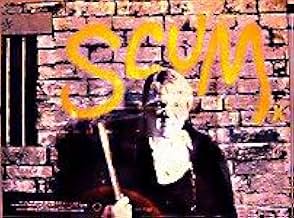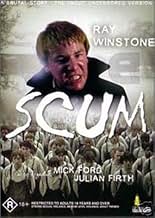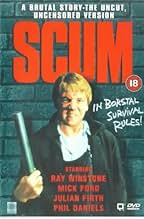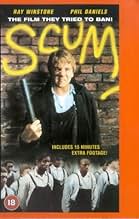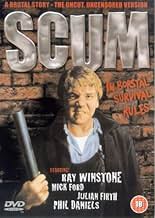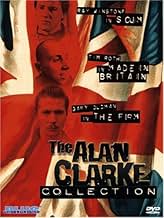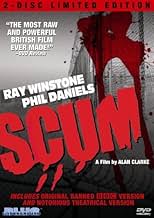An uncompromising story of life in a British juvenile offender institution in the '70s.An uncompromising story of life in a British juvenile offender institution in the '70s.An uncompromising story of life in a British juvenile offender institution in the '70s.
Philip DaCosta
- Jackson
- (as Philip Da Costa)
- Director
- Writer
- All cast & crew
- Production, box office & more at IMDbPro
7.514.2K
1
2
3
4
5
6
7
8
9
10
Featured reviews
Although I was released more than 30 years ago, I was pleasantly surprised to find that Scum has not lost any of its punch.
Scum is an unforgiving portrayal of both physical and psychological abuse of the British borstal system; 1 hour and 30 minutes. The movie explores the borstal's hierarchy, analyzing both the wardens and the inmates ' actions and responsibilities, asking who is the worst. As Carlin (Ray Winstone) joins the borstal, the hierarchy is shattered. Carlin says he's looking for' no trouble,' but he's just as pugnacious or even more skullduggerous than the others. Scum describes the angry resentment of inequality in' correctional' institutions, much like' Cool Hand Luke' or' One Flew Over The Cuckoo's Nest.' Personally, I find few things worse than power abuse, whether in an institution or in a family. I'm sure that many would agree with me on that, and then make Scum an engrossing, resonant, and uncomfortable watch for everyone. Archer's protagonist, an articulate and apparently committed vegetarian who's out to make life difficult for the screws, delivers fragments of Roy Minton's script that beautifully examine the process and the angry men who staff these institutions-" Even though you've spent your life in jail, you're still just a simple cop. Now, who's got the stick for that? Us. Who's paying for that every day. Scum achieves what it aims to accomplish through convincing performance and blunt realism: portraying the reprehensible conditions of terrorism, discrimination and bribery in these institutions. One might wonder if the movie exaggerated these circumstances, but in 1982 government abolished the borstal scheme, replacing it with' Youth Custody Centres.' I assume it speaks volumes for the reputation of Scum.
The film the BBC couldn't stop you seeing.
Scum (the screenplay) was originally banned in 1977 - the year it was made - on the instructions of the BBC who had commissioned it. This was on the grounds of it being both too realistic in its presentation and simultaneously a work of fiction. The film follows the progression of three boys at borstal (prison for males ages 11-16) from arrival to the social dominance of one of them. It's a blackly humorous and scathing study of the (physical *and* mental) violence inherent in any social system, and particularly in the 'justice' system.
The screenplay was remade as a feature film in 1979, starring most of the original cast and featuring most of the original script, although a couple of scenes (featuring sexual abuse, though physical and racial abuse were deemed acceptable...) were presumably cut from the script because they wouldn't pass even the BBFC censor.
The original screenplay has subsequently been shown on UK television once. I happened to have the video running. With a high-quality tape in it. Lucky, that! It compares very favourably to the film, though the film format appears inferior (lower budget at the BBC), the quality of the performances is possibly better.
Scum is one of the most important screenplays to have been made, and shown, on British television, because it reveals the changing attitudes of the censors, and the nature of political censorship in the UK.
The film itself does not reveal this history.
The screenplay was remade as a feature film in 1979, starring most of the original cast and featuring most of the original script, although a couple of scenes (featuring sexual abuse, though physical and racial abuse were deemed acceptable...) were presumably cut from the script because they wouldn't pass even the BBFC censor.
The original screenplay has subsequently been shown on UK television once. I happened to have the video running. With a high-quality tape in it. Lucky, that! It compares very favourably to the film, though the film format appears inferior (lower budget at the BBC), the quality of the performances is possibly better.
Scum is one of the most important screenplays to have been made, and shown, on British television, because it reveals the changing attitudes of the censors, and the nature of political censorship in the UK.
The film itself does not reveal this history.
Hard To Watch & Impossible To Ignore
It is the late 70's and the borstal system is in full effect in England. To one such institution a young man by the name of Carlin is sent. Though ostensibly there for reform and education, the brutality of the place and its inhabitants (wardens and inmates alike) is more conducive of violence than rehabilitation. Facing daily beatings and constant subjugation, Carlin soon realises that he must rise up the pecking order if he wants any kind of respect or security, and that the best way to do that is through thuggery. Whether or not Carlin will conquer the borstal, or be destroyed by the place, remains to be seen in Alan Clarke's uncompromising, unforgettable 'Scum.'
'Scum' is a cutting treatise against borstals and those who ran them, which must have shocked audiences when it was released. It was not until the passing of The Criminal Justice Act of 1982 that borstals were officially shuttered across the UK, so the film was a most contemporary excoriation in 1979. Clarke had actually filmed 'Scum' two years earlier, for the BBC'S Play For Today series. It was deemed too unremitting for television, so it was rewritten, the same cast (largely) were assembled- as well as a new crew- and 'Scum' was reshot and released as the full-length feature discussed here now.
'Scum' is a tough film, one that is immensely affecting and unpredictable. The tale is bleak and harrowing, full of uncomfortable moments of persecution and ferocity. Written by Roy Minton, the story portrays the system of borstal to be a deeply flawed one that does more harm than good, led by brutes and disinterested stooges who believe that mercilessness is a positive attribute. The children have no hope of amelioration when trapped in that vicious, defunct system. The savagery they engage in is a barbaric but understandable, inevitable cry of frustration against the detachment and callousness with which they are treated.
The film is shot by cinematographer Phil Meheux, who has worked on movies ranging in quality and subject matter from 'The Long Good Friday' to 'Beverly Hills Chihuahua.' His work for 'Scum' is strikingly natural and gritty. He captures the starkness of the institution and its grounds with his documentary-style camera work masterfully, reinforcing the aura of cold nastiness which surrounds and envelops the inmates. Mike Porter's unembellished production design must also be mentioned, as it is understated work that is most notable, making the locations look lived-in and true-to-life. Additionally, Michael Bradsell's tight editing keeps the film running smoothly at a fast, even pace; ever building in intensity towards an explosive finale.
The great Ray Winstone stars as Carlin, delivering an intense, towering performance that is captivating and frightening both. One of his first acting roles, he performs with an ease and power unmatched by the rest of the cast, dominating the movie completely. Never once do you feel that Winstone is acting on screen, he inhabits the character of Carlin as if by birth-right. Playing him like a young Richard III and Reggie Kray combined, Winstone showcases seemingly boundless depth, energy and ability; leaving an indelible impression on the viewer.
Winstone's supporting cast don't let him down, each and all delivering strong performances, with a few particularly of note. Mick Ford plays a fellow inmate named Archer, who believes in pacifism, and Julian Firth stars as another, the introverted, ill-fated Davis. Both impress with their emotional range and perspicuity. John Judd and Philip Jackson star as two of the wardens, both playing sadistic egocentrics with real verve and panache. Judd is especially sinister, and his seedy grin will no doubt linger in the mind long after the credits have rolled on 'Scum.'
Uncompromising and unforgettable, Alan Clarke's 'Scum' is a powerful piece of cinema that holds a mirror up to society; reflecting back a cruel, cold and very real vision of life in the borstal system. Featuring strong performances all round- including a commanding central one from Ray Winstone- as well as striking visuals, the film impresses on nearly every level. It is shockingly violent and sadly realistic, making it hard to watch; but also thoroughly impossible to ignore.
'Scum' is a cutting treatise against borstals and those who ran them, which must have shocked audiences when it was released. It was not until the passing of The Criminal Justice Act of 1982 that borstals were officially shuttered across the UK, so the film was a most contemporary excoriation in 1979. Clarke had actually filmed 'Scum' two years earlier, for the BBC'S Play For Today series. It was deemed too unremitting for television, so it was rewritten, the same cast (largely) were assembled- as well as a new crew- and 'Scum' was reshot and released as the full-length feature discussed here now.
'Scum' is a tough film, one that is immensely affecting and unpredictable. The tale is bleak and harrowing, full of uncomfortable moments of persecution and ferocity. Written by Roy Minton, the story portrays the system of borstal to be a deeply flawed one that does more harm than good, led by brutes and disinterested stooges who believe that mercilessness is a positive attribute. The children have no hope of amelioration when trapped in that vicious, defunct system. The savagery they engage in is a barbaric but understandable, inevitable cry of frustration against the detachment and callousness with which they are treated.
The film is shot by cinematographer Phil Meheux, who has worked on movies ranging in quality and subject matter from 'The Long Good Friday' to 'Beverly Hills Chihuahua.' His work for 'Scum' is strikingly natural and gritty. He captures the starkness of the institution and its grounds with his documentary-style camera work masterfully, reinforcing the aura of cold nastiness which surrounds and envelops the inmates. Mike Porter's unembellished production design must also be mentioned, as it is understated work that is most notable, making the locations look lived-in and true-to-life. Additionally, Michael Bradsell's tight editing keeps the film running smoothly at a fast, even pace; ever building in intensity towards an explosive finale.
The great Ray Winstone stars as Carlin, delivering an intense, towering performance that is captivating and frightening both. One of his first acting roles, he performs with an ease and power unmatched by the rest of the cast, dominating the movie completely. Never once do you feel that Winstone is acting on screen, he inhabits the character of Carlin as if by birth-right. Playing him like a young Richard III and Reggie Kray combined, Winstone showcases seemingly boundless depth, energy and ability; leaving an indelible impression on the viewer.
Winstone's supporting cast don't let him down, each and all delivering strong performances, with a few particularly of note. Mick Ford plays a fellow inmate named Archer, who believes in pacifism, and Julian Firth stars as another, the introverted, ill-fated Davis. Both impress with their emotional range and perspicuity. John Judd and Philip Jackson star as two of the wardens, both playing sadistic egocentrics with real verve and panache. Judd is especially sinister, and his seedy grin will no doubt linger in the mind long after the credits have rolled on 'Scum.'
Uncompromising and unforgettable, Alan Clarke's 'Scum' is a powerful piece of cinema that holds a mirror up to society; reflecting back a cruel, cold and very real vision of life in the borstal system. Featuring strong performances all round- including a commanding central one from Ray Winstone- as well as striking visuals, the film impresses on nearly every level. It is shockingly violent and sadly realistic, making it hard to watch; but also thoroughly impossible to ignore.
Shocking and realistic portrayal of a young offender's institution
The story on which Scum is based was originally penned to be a part of a BBC series 'Play For Today' but was not shown at the time. It was made into a film two years later by Alan Clarke; and the reason it was not shown earlier is clear to see; as Scum is a shocking and unflinching account of life in Britain's now defunct Borstal system. The film is gritty and realistic and features no shortage of violence, so it's hardly a surprise that it didn't go down particularly well with Britain's conservative film censors. The film revolves around a young offender's institution in Britain. The place is shook up upon the arrival of a young man named Carlin. Carlin was moved from another institution for fighting with a guard, and arrives with his reputation already in front of him. He soon finds out how the prison works and quickly seeks to take out "the daddy" and his cronies to take control of the place himself.
Ray Winstone would go on to have a good career playing hard man types; and this is where it all started. The actor has a much younger look about him than the grizzled actor many will know better; but he still fits the bill well here and is always believable in his role. The film also features a number of faces that will be familiar to anyone who knows anything about British TV. Scum doesn't just rely on violence to deliver its shocks; the whole atmosphere of the central location is thoroughly grim and the guards' attitude towards the inmates does not inspire confidence in the system that the film is portraying. The film does not generally directly expose the flaws of the prison system; although this is given some attention by way of Mick Ford's Archer character; that cleverly condemns the system through dialogue. The story runs smoothly for the first two thirds of the film, while the final third is dedicated to the film's most shocking scenario; a sequence of events that is most likely, from anything in the film, to stay with the viewer once the film is over. Overall, this is an excellent little film that deserves to be viewed by anyone that considers themselves a fan of wayward cinema.
Ray Winstone would go on to have a good career playing hard man types; and this is where it all started. The actor has a much younger look about him than the grizzled actor many will know better; but he still fits the bill well here and is always believable in his role. The film also features a number of faces that will be familiar to anyone who knows anything about British TV. Scum doesn't just rely on violence to deliver its shocks; the whole atmosphere of the central location is thoroughly grim and the guards' attitude towards the inmates does not inspire confidence in the system that the film is portraying. The film does not generally directly expose the flaws of the prison system; although this is given some attention by way of Mick Ford's Archer character; that cleverly condemns the system through dialogue. The story runs smoothly for the first two thirds of the film, while the final third is dedicated to the film's most shocking scenario; a sequence of events that is most likely, from anything in the film, to stay with the viewer once the film is over. Overall, this is an excellent little film that deserves to be viewed by anyone that considers themselves a fan of wayward cinema.
difficult to watch, but worth seeing once
I've now seen this movie several times, although admittedly watching it can hardly be classed as a 'pleasure'. Alan Clarke made this feature after his TV play from two years earlier was banned, and perhaps had more freedom here to explore the issues.
Carlin (an early, showy appearance from Ray Winstone) is sent to Borstal where he quickly establishes himself as a tough boy with a regime of strength. Typical Winstone performance in many ways. In the prison with him are his shadow Richards (played by Phil Daniels); cynical, bare-footed Archer (Mick Ford, these days more often seen the other side of the law in such dramas as 'Silent Witness'); black inmate Angel (Davidson Knight); and quiet Davis, the boy who gets picked on for being a loner (a quite staggering performance from Julian Firth, who never really lived up to this early promise).
Scum is uncompromising - violent (there's a rape which leaves little to the imagination, a suicide, several fights); scathing in its condemnation of the 'system' (which thankfully is not like this now) - and yet finds time for character development and convincing plot. Without any music it is purely presented in documentary style, matter-of-fact 'this is how it is'.
Not a fun movie, but one which tries to make a point, and, if nothing else, has the power to shock and make you remember certain sections for a long time after viewing. Recommended.
Carlin (an early, showy appearance from Ray Winstone) is sent to Borstal where he quickly establishes himself as a tough boy with a regime of strength. Typical Winstone performance in many ways. In the prison with him are his shadow Richards (played by Phil Daniels); cynical, bare-footed Archer (Mick Ford, these days more often seen the other side of the law in such dramas as 'Silent Witness'); black inmate Angel (Davidson Knight); and quiet Davis, the boy who gets picked on for being a loner (a quite staggering performance from Julian Firth, who never really lived up to this early promise).
Scum is uncompromising - violent (there's a rape which leaves little to the imagination, a suicide, several fights); scathing in its condemnation of the 'system' (which thankfully is not like this now) - and yet finds time for character development and convincing plot. Without any music it is purely presented in documentary style, matter-of-fact 'this is how it is'.
Not a fun movie, but one which tries to make a point, and, if nothing else, has the power to shock and make you remember certain sections for a long time after viewing. Recommended.
Did you know
- TriviaCarlin was originally a Glaswegian, but was changed into a Cockney when Alan Clarke saw a then-unknown Ray Winstone walk in a unique way.
- GoofsAll borstal inmates were subject to the same mandatory short-back-and-sides haircut, yet a vast array of hairstyles are shown throughout the film, including afros.
- Alternate versionsNorwegian cinema version was cut in the rape scene and the suicide scene. Later video versions are uncut.
- ConnectionsFeatured in The South Bank Show: Keith Jarrett/Scum (1979)
- SoundtracksDirty Last Night
(uncredited)
Music by John Dickson and Elfed Hayes
De Wolfe Music Ltd
- How long is Scum?Powered by Alexa
Details
- Release date
- Country of origin
- Official site
- Language
- Also known as
- Scum más allá de la degradación
- Filming locations
- Shenley Mental Hospital, Shenley, Hertfordshire, England, UK(Borstal Prison)
- Production companies
- See more company credits at IMDbPro
Box office
- Budget
- £250,000 (estimated)
- Gross US & Canada
- $6,461
- Opening weekend US & Canada
- $1,948
- Jun 18, 2017
- Gross worldwide
- $6,461
Contribute to this page
Suggest an edit or add missing content


